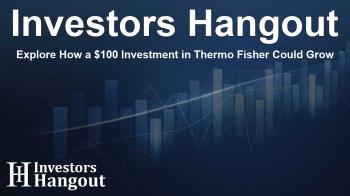Explore How a $100 Investment in Thermo Fisher Could Grow

The Growth of Investing in Thermo Fisher Scientific
Thermo Fisher Scientific (TMO) has shown remarkable resilience and growth in the financial markets. Over the past decade, the company has consistently outperformed the market, producing an average annual return of around 13.22%. This impressive figure translates into the stock consistently adding value for its investors.
Understanding the Impact of Compound Growth
A critical lesson learned from investing in TMO is the significant effect of compound growth over time. For instance, if an investor committed $100 to TMO a decade ago, that investment would now be worth approximately $348.52 with the stock quoted at around $471.63 at present. This highlights just how powerful the effects of investing can be.
Why Choose Thermo Fisher Scientific?
Investing in Thermo Fisher Scientific offers not just historical performance, but also a promising future. With a current market capitalization of $177.93 billion, the company continues to expand its reach in the biotechnology and life sciences sector. Its dedication to innovation positions it well to adapt to industry changes and capture emerging opportunities.
Market Position and Future Outlook
Looking ahead, Thermo Fisher's diversified portfolio in laboratory products, healthcare, and life sciences positions it strongly for sustained growth. The ongoing demand for advanced healthcare solutions is expected to bolster the company's revenue streams and enhance its market valuation. As a key player in scientific research and diagnostics, TMO is well-equipped to thrive in a rapidly evolving market.
Investment Considerations
When considering an investment in Thermo Fisher Scientific, it's essential to look at both its past performance and future potential. The impressive returns of nearly 1.45% annually above market averages shed light on the company's ability to deliver value. Potential investors should evaluate their financial goals and risk tolerance levels before making investment decisions.
Frequently Asked Questions
1. What is the historical performance of Thermo Fisher Scientific?
Thermo Fisher Scientific has outperformed the market historically, achieving an average annual return of about 13.22% over the past ten years.
2. How much would a $100 investment in TMO have grown?
A $100 investment in TMO ten years ago would be worth approximately $348.52 today.
3. What factors contribute to TMO's growth and success?
Factors include a strong market position in life sciences and biotechnology, continuous innovation, and robust financial performance.
4. What should investors consider before investing in TMO?
Investors should evaluate their risk tolerance, financial goals, and the company’s future growth potential.
5. Why is investing in Thermo Fisher Scientific a good idea?
Thermo Fisher Scientific is well-positioned for future growth due to its strong market presence, innovative capabilities, and the increasing demand for healthcare solutions.
About The Author
Contact Kelly Martin privately here. Or send an email with ATTN: Kelly Martin as the subject to contact@investorshangout.com.
About Investors Hangout
Investors Hangout is a leading online stock forum for financial discussion and learning, offering a wide range of free tools and resources. It draws in traders of all levels, who exchange market knowledge, investigate trading tactics, and keep an eye on industry developments in real time. Featuring financial articles, stock message boards, quotes, charts, company profiles, and live news updates. Through cooperative learning and a wealth of informational resources, it helps users from novices creating their first portfolios to experts honing their techniques. Join Investors Hangout today: https://investorshangout.com/
The content of this article is based on factual, publicly available information and does not represent legal, financial, or investment advice. Investors Hangout does not offer financial advice, and the author is not a licensed financial advisor. Consult a qualified advisor before making any financial or investment decisions based on this article. This article should not be considered advice to purchase, sell, or hold any securities or other investments. If any of the material provided here is inaccurate, please contact us for corrections.

